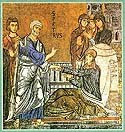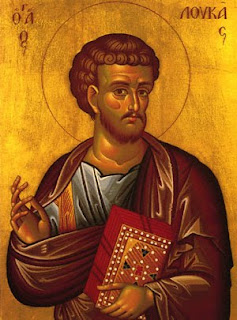V. Rev. Fr. Nicholas Apostola
Pastor,
St. Nicholas Orthodox ChurchGuest Blogger
The Epistle lesson this week resumes our study and reading of St. Paul’s Letter to the Galatians (1:11-19). St. Paul had founded this community. After he left Galatia, a group of Jewish Christians (Judaizers) came there and began to undermine what St. Paul had been teaching by shaking the confidence that the members of the Church there had in his ‘apostleship.’ St. Paul needs to ground the authenticity of his direct experience of our Lord Jesus Christ in order to defend what he has taught them.
In the very first verse of this Letter St. Paul lays out the basis of his authority: “Paul an apostle—not from men nor through man, but through Jesus Christ and God the Father, who raised him from the dead.” (Galatians 1:1) After he tells the Galatians his deep concern about the things he has heard concerning them, he takes up in greater detail how exactly it was that God had called him.
“For I would have you know, brethren, that the gospel which was preached by me is not man’s. For I did not receive it from man, nor was I taught it, but it came through a revelation of Jesus Christ.” (v. 11-12) Sometimes we read over these words quickly, not stopping to think about what he is actually saying. He is telling us that all his knowledge of our Lord Jesus Christ came to him directly through revelation or even revelations! This is the meaning of the words “I did not receive it from man, nor was I taught it.” He didn’t learn about Jesus in the way we have, by reading, listening, and worshiping. Jesus came to him directly.
In order to drive home the point he reminds them of the details of his conversion. “For you have heard of my former life in Judaism, how I persecuted the church of God violently and tried to destroy it; and I advanced in Judaism beyond many of my own age among my people, so extremely zealous was I for the traditions of my fathers.” (v. 13-14) Paul, or Saul as he was known before his conversion, terrorized the early Christians. Saul was present at the stoning of St. Stephen (Acts 8:1). He was “was ravaging the church, and entering house after house; he dragged off men and women and committed them to prison.” (Acts 8:3) He received a commission from the authorities in Jerusalem to go to Damascus and root out Christians there and bring them back to Jerusalem for trial and imprisonment (Acts 9:1). He was “extremely zealous.”
It was on his way to Damascus that the Lord appeared to him in a vision of blinding light. (Read the entire account of the vision and his conversion in Acts 9:3-31.) It is this experience that Paul reminds the Galatians of when he says, “he who had set me apart before I was born, and had called me through his grace, was pleased to reveal his Son in me, in order that I might preach him among the Gentiles.” (v. 15-16) St. Paul received a vision and a commission. In order to emphasize both the power and the uniqueness of his vision, he says that God the Father was pleased to reveal his Son in me.” St. John Chrysostom hones in on this preposition “in.” He says, why does he say, “to reveal His Son in me,” and not “to me?” It is to signify, that he had not only been instructed in the faith by words, but that he was richly endowed with the Spirit; that the revelation had enlightened his whole soul, and that he had Christ speaking within him. He experienced the Lord directly, and he was told specifically what he was to do: preach and convert the Gentiles.
In order to emphasize the fullness of this revelation he tells them, “I did not confer with flesh and blood, nor did I go up to Jerusalem to those who were apostles before me, but I went away into Arabia; and again I returned to Damascus.” (v. 16-17) By “flesh and blood” he is referring to the other Apostles, but in a deeper sense he means that he wasn’t taught by them.
After this experience he went into Arabia. There is a difference of opinion among Biblical scholars as to what he was doing in Arabia (Arabia here means the desert of eastern and southeastern Syria). Some believe that he went into the desert to pray and reflect on what God had called him to. St. John Chrysostom is of the opinion that he went to preach to the tribes there; using this as an opportunity to sharpen his message. Both of these views are possible. What we do know is that when he came back to Damascus he was a powerful witness to the Gospel.
It might be helpful to remind ourselves what the word “Gospel” means. The Greek word is “Evanghelion” (εὐαγγέλιον), and it literally means: “Good News.” It was oftentimes associated with the accession to the throne of a new emperor, or the birth of an heir. To use this word about Jesus Christ was already to make a claim as to whom He was.
“Then after three years I went up to Jerusalem to visit Cephas, and remained with him fifteen days,” St. Paul tells them. “But I saw none of the other apostles except James the Lord’s brother.” (v. 18-19) He wants to show the Galatians that he is of one mind with the others Apostles; he respects them as older brothers and friends. He goes to “visit” Peter and spent two weeks with him. He shows his respect to James, the Lord’s brother, who is clearly in charge of the Jerusalem Church; much beloved and held in high-regard by all, Christians and Jews.
In these few verses we catch a glimpse into the man who God called to preach the Gospel to the Gentiles, to us. We see how God was preparing him for this even before he was born. We stand in awe of what God accomplished through him. And, we are humbled by the deep sacrifices he suffered for the sake of the Gospel.
 Saint Tabitha, the widow raised from the dead by the Apostle Peter, was a virtuous and kindly woman, belonged to the Christian community in Joppa. Being grievously ill, she suddenly died. At the time, the Apostle Peter was preaching at Lydda, not far from Joppa. Messengers were sent to him with an urgent request for help. When the Apostle arrived at Joppa, Tabitha was already dead. On bended knee, St Peter made a fervent prayer to the Lord. Then he went to the bed and called out, “Tabitha, get up!” She arose, completely healed (Acts 9:36).
Saint Tabitha, the widow raised from the dead by the Apostle Peter, was a virtuous and kindly woman, belonged to the Christian community in Joppa. Being grievously ill, she suddenly died. At the time, the Apostle Peter was preaching at Lydda, not far from Joppa. Messengers were sent to him with an urgent request for help. When the Apostle arrived at Joppa, Tabitha was already dead. On bended knee, St Peter made a fervent prayer to the Lord. Then he went to the bed and called out, “Tabitha, get up!” She arose, completely healed (Acts 9:36).



 On Saturday evening I traveled with Fr. Greg to Saint Paraskeva Church in Wakefield, Massachusetts for a wonderful event. The parish in Wakefield, the one I was assigned too as a seminarian by the way, was the recipient of relics of Our Holy Mother Paraskeva. What an amazing night to be in the presence of Saintly Relics.
On Saturday evening I traveled with Fr. Greg to Saint Paraskeva Church in Wakefield, Massachusetts for a wonderful event. The parish in Wakefield, the one I was assigned too as a seminarian by the way, was the recipient of relics of Our Holy Mother Paraskeva. What an amazing night to be in the presence of Saintly Relics.

